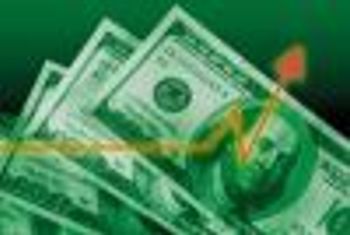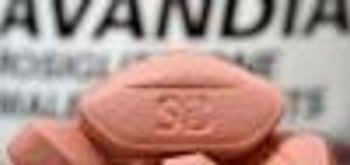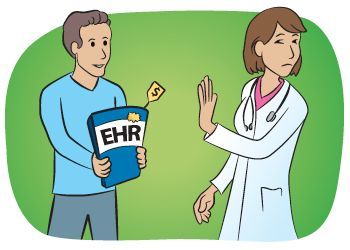
A physician who is having trouble finding a nanny who is willing to be paid "on the books" wants to know the downsides of not paying the so-called nanny tax.

A physician who is having trouble finding a nanny who is willing to be paid "on the books" wants to know the downsides of not paying the so-called nanny tax.

These constructive exercises can help calm your psyche after you've received notice of an intended law suit, or an audit, or just a bile-filled nasty letter from a disgruntled patient.

So the rumors were true: French drug giant approached Genzyme about a possible acquisition, sparking rumors the company will attract rival suitors in the U.S. Meanwhile, shares of Onyx Pharmaceuticals and Oncolytics Biotech rose on upbeat reports on clinical trials of their cancer treatments.

The market appears to be shifting from a more bearish to possible bullish scenario, after an impressive rally back above the lows of the major market plunges in early May. We'll be looking for an encouraging sign that institutional investors are bringing more cash inflows into the market.

Recent articles on physician income, disparity in pay and Medicare cuts have generated many thoughtful, and often emotional, comments from doctors. We've compiled some of their remarks here, to let readers report on what they're seeing within their own fields.

Although that 10-minute spin around the neighborhood is supposed to tell you whether a car you're considering buying is right for you, it rarely does. This guide will help you make sure the time you spend on a test drive isn't totally wasted.

Nearly half of doctors surveyed showed a clear preference for using the iPhone over the Blackberry to manage personal and practice business, and access medical information, according to a new survey of smartphone use by physicians.

Doctors need to start thinking seriously about insurance company ratings and rankings, as our incomes and status will increasingly become hostage to them. History shows that attempting to bring incentives to bear on physicians to reduce costs or improve care often carries a high risk of backfiring.

Many wealthy investors are turning to rare and collectible items, such as art, race cars and race horses, to protect their wealth from financial market fluctuations. But what you consider an investment may be seen as just a hobby by the IRS -- and that can have serious tax consequences.

Life sciences stocks rocketed to stellar gains in the first three months of the year, only to crash back to earth in the second quarter. Here's a rundown of the first-half's winners and losers, and a look ahead to the third quarter.

Harvard Medical School imposed strict new rules for physicians on staff that include restrictions on gifts, travel and meals, speaker fees, and income from board memberships. Is there any way Harvard doctors can earn money on the side? Turns out, there's more than just a bit of wiggle room in the rules.

Edward Jones and RBC Wealth Management are tops in investor satisfaction, according to the latest J.D. Power and Associates survey. Overall, investors were more satisfied with their investment advisors, but increasingly feel like investment firms are more interested in profits than customer service.

These days, stock market watchers are in search of two types of crosses: the death cross and the golden cross -- Wall Street jargon for indicators in the stock market that suggest its direction, up or down. This type of sign is especially important in a volatile market such as the one we're in now.

With managed care and the rising cost of running a medical practice continuing to eat away at physician incomes, it would be easy to assume that the gap between compensation in academic practices versus private practices would have narrowed. That assumption would be wrong. A recent survey shows compensation in academic practices continues to lag that of private practices.

In the fourth in a series on the many wonders of small ship cruising through South East Alaska, our travel columnists visit the tiny village of Tenakee Springs.

Putting a tax strategy in place is essential for physicians given the massive federal deficits and an administration determined to repeal the Bush era tax cuts. Three specific tax strategies pertinent to doctors include redeeming stock in a medical practice, Roth IRA conversions, and charitable remainder trusts.

A reader wants to know how he can stop shady-sounding brokers and fundraisers from contacting him at home. Doctors are often targeted by this kind of fraud, because they are entrepreneurial, self-reliant, and -- most important -- affluent.

Forbes magazine counts down the "Worst Paying Jobs for Doctors" this week, and for many physicians in training the numbers are disquieting. The No. 1 worst-paying doctor job? No surprise here: Family practice, where physicians earned an average of $175,000 last year.

Matt Silverman's Mashable's Social Media Guide for Small Businesses is a fantastic synopsis and, by far, the most comprehensive, free overview of social media for small business owners I've encountered yet.

"Old Spice Guy," the mother of all viral media ad campaigns, has already sparked imitators, including a very clever -- and equally funny -- parody by student employees and video staff at Brigham Young University that uses humor to urge students to use the library.

Under new federal rules, copays, deductibles, and coinsurance payments will be eliminated preventive care, such as immunizations, blood pressure, diabetes, and cholesterol tests, certain cancer screenings, and counseling services for smoking, alcohol, depression, and obesity.

One in three physicians who know a colleague is impaired or incompetent would not report that person to the proper authorities, a new survey reports. Doctors, has this ever happened to you?

The FDA panel ruling on Avandia captured headlines and weighed on shares GlaxoSmithKline this week, but a more decisive panel ruling on Vivus's obesity drug Qnexa more than halved its stock price. Next up: The FDA weighs Arena Pharmaceuticals lorcaserin.

Online Ponzi schemes known as high-yield investment programs (HYIPs) that claim to offer returns of up to 100 percent or more -- per day -- are a growing threat to investors, the Financial Industry Regulatory Authority warned this week.

Physicians routinely screen patients for a variety of physical ailments, but a recent pilot project is asking doctors to screen patients for evidence of financial fraud and to identify patients who might be at risk.

Although the negotiating aspect of selling a used car hasn't changed, the actual process is a whole different ballgame. It's worth exploring how to approach a used-car sale, because those of you who figure the benefits of a dealer trade-in outweigh the hassles of selling a car yourself are paying dearly for the privilege.

"Meaningful use," if used as a way to obtain federal incentive money is at best meaningless, at worst -- without numerous other initiatives -- it can disrupt your business. It seems to violate the dictum, "Do no harm."

The biggest healthcare-recruiting challenge is finding, screening and qualifying the best candidates in a sea of applicants, and then attracting the right people. Some steps to take your recruiting approach to the next level.

It's tempting to ignore a minor car accident, rather than face the premium hikes that may follow if you tell your auto-insurance company. But there are risks to not reporting an accident -- here are some considerations.

We live in a "crisis culture" -- the financial crisis, the energy crisis, the subprime-mortgage crisis. By calling every upheaval a crisis, the word gets watered down to the point of meaninglessness. Here's a real impending crisis: The primary care crisis. The profession of primary care physician in this country is dying. Fast. Physicians must find a leader who can articulate the serious repercussions of a growing primary care shortage. Otherwise, it will simply become the next crisis of the times.